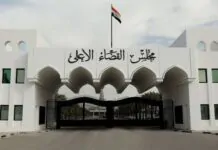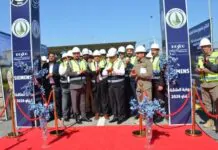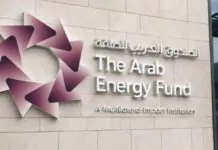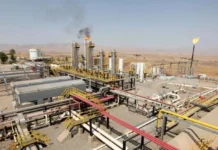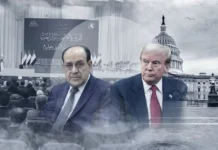Government Advisor: The Central Bank Has Amended The List Of Iraqi Banks To Comply With International Standards.
Baghdad – WAA – Hassan Al-Fawaz The Prime Minister’s Advisor for Banking Affairs, Saleh Mahoud, confirmed on Wednesday that there are agreements with European entities to support investment projects in Iraq, while noting that
five projects are awaiting a Cabinet decision to issue sovereign guarantees. Mahoud told the Iraqi News Agency (INA):
“The Central Bank has made an amendment to the list of Iraqi banks, which was limited to government banks, in accordance with the standards required by external parties, foreign correspondents, and the bank that finances those projects.”
He added that “over the course of two years, the Sovereign Guarantees Committee has made great efforts in coordinating with the guaranteeing institutions and the financing banks, as well as its efforts in coordinating the relationship between the Industrial Bank and the Ministry of Finance.”
He pointed out that “there are agreements previously signed with Spanish, German and English entities, and one of those projects has obtained a sovereign guarantee, and all procedures will be completed within a period of two weeks after all the details related to the final accounts are resolved.”
He explained that “five projects are awaiting the Cabinet’s decision to issue the sovereign guarantees stipulated in one of the paragraphs of the general budget, amounting to one trillion Iraqi dinars, to cover all projects,” noting that “the number of projects reached 6, and the Cabinet approved the disbursement of 600 billion dinars, and 400 billion dinars
remain.”
He stated that “Based on the recent Cabinet decision, the Central Bank issued an amendment that includes a list of banks that were previously limited to government banks, in accordance with the standards required by external parties, foreign correspondents, and the bank providing the financing.
According to that amendment, the Sovereign Guarantees Committee was informed that the remaining projects within the one trillion ceiling should be handled by private banks.”
He pointed out that “the Trade Bank of Iraq (TBI) has been informed that the upcoming projects will be in the private sector, and within a week or ten days there is an agreement waiting to be signed with the Dutch.” https://ina.iq/ar/economie/247240-.html
After Years Of Stagnation, A Government Advisor Says 75 Iraqi Companies And Factories Are Exporting Their Products Abroad.
Baghdad – WAA – Hassan Al-Fawaz Hamoudi Al-Lami, the Prime Minister’s Advisor for Industry, Development and the Private Sector, confirmed on Wednesday that indicators of industrial recovery in Iraq have begun to appear clearly, noting that 75 Iraqi companies and factories are exporting their products abroad.
Al-Lami told the Iraqi News Agency (INA) that “Iraqi products are now reaching foreign markets in Arab and European countries,” stressing that this represents “a return of confidence in the local product and an expansion of the national production base.”
Al-Lami added that “the latest data from the Ministry of Trade, which is responsible for granting export licenses, indicates that 21 Iraqi food companies have recently obtained official export licenses and have already begun marketing their products to dozens of Arab and European countries, including the Gulf countries, Jordan, Turkey, Kuwait, Egypt and others.”
He added that “54 national factories have already begun exporting their products abroad, in a move that reflects the recovery of the national industrial sector after years of stagnation.”
He pointed out that “Iraqi products that have reached foreign markets include batteries, reinforcing steel, carpets, textile products, and electrical wires and cables,” stressing that this represents “a return of confidence in the local product and an expansion of the national production base.”
Al-Lami explained that “the government has taken a package of measures and legal amendments during the past period to facilitate the investment environment and support the industrial sector, including amending a number of Cabinet decisions and issuing new decisions aimed at attracting investors and addressing the obstacles facing local factories.” https://ina.iq/ar/economie/247248-75.html
MP: Iraq Will Become One Of The Most Important Gas Exporters In The Middle East Within Three Years
November 6, Information / Baghdad.. MP Ali Al-Lami confirmed on Thursday thatIraq will become one of the key players in the Middle East in the field of natural gas exports within the next three years.
Al-Lami told Al-Maalomah that “Iraq has a series of major gas fields that contain large reserves of natural gas, especially the Mansouriya and Akaz fields, as well as other fields that are currently being developed,” indicating that “all of these fields are currently undergoing advanced development operations, and the first stages of actual production are expected to begin during 2026.”
He added that “completing the production phases in parallel with ending the flaring of associated gas in the oil fields will make Iraq, within three to four years, one of the main players in exporting natural gas in the Middle East, if the pace of development continues at the current level.”
Al-Lami pointed out that “exporting natural gas at high levels will grant Iraq significant economic flexibility, especially given the fluctuations in the oil market from time to time.
This will contribute to stabilizing financial revenues and investing in the gas wealth that has been wasted for decades due to flaring in oil fields.” (End of quote 25)
https://almaalomah.me/news/114721/economy/نائب:-العراق-سيتحول-إلى-أحد-أهم-مصدري-الغاز-في-الشرق-الأوسط
Iraq Saves 8 Trillion Dinars After Closing The Gasoline Import File… An Economic Step That Restores Balance To The Budget And Opens The Door To Exports For The First Time
November 6, 2025 Baghdad / Iraq Observer In an economic transformation considered one of the most significant achievements of the last two decades, Iraq officially announced its entry into a phase of complete self-sufficiency in petroleum products.
This marks a shift from a country that relied for decades on importing gasoline, gas, and fuel oil to a producer and exporter capable of meeting its domestic needs and opening new avenues for regional and international exports.
This announcement, made in a statement issued by the office of Prime Minister Mohammed Shia al-Sudani on November 4, 2025, represents a turning point in the history of the Iraqi oil industry, following years of continuous work to rehabilitate and operate the major refineries in Karbala, Baiji, and Basra, and to expand production lines to meet increasing domestic and international demand.
Legal and banking researcher Saif Al-Halfi confirmed in a special statement to “Iraq Observer” that Iraq has achieved an unprecedented historical accomplishment in the oil industry, after officially announcing its entry into the stage of self-sufficiency in oil derivatives, moving from the position of an importing country to the position of a producer and exporter, in a step he described as “a qualitative shift in the structure of the national economy and the opening of a new door towards manufacturing industries and clean energy.”
Al-Halfi explained that the oil refining sector represents the backbone of the Iraqi economy today, as it is the bridge that transforms low-priced crude oil into vital, high-value derivatives such as gasoline, kerosene, gas oil, liquefied gas, and jet fuel. He pointed out that the high global and local demand for these derivatives has made developing refineries a strategic goal for the government to reduce imports and preserve hard currency. ]
He added that the announcement issued by the office of Prime Minister Mohammed Shia Al-Sudanion November 4, 2025, confirmed the achievement of complete self-sufficiency after three years of intensive efforts to rehabilitate and operate Iraqi refineries, including the Karbala refinery, the Baiji refinery, and the expansion of the Basra (Shuaiba) refinery, indicating that this step “astonished foreign refining companies and confused traders who had been exporting derivatives to Iraq for many years.”
Al-Halfi explained that Iraq currently has more than ten major refineries distributed across the north, center, and south of the country. He noted that the Karbala refinery, officially opened in 2023 with a capacity of 140,000 barrels per day, represents a significant leap forward thanks to its use of environmentally friendly technologies and its production of fuel that meets European standards.
The Basra (Shuaiba) refinery operates at a capacity of 210,000 barrels per day and is one of the oldest refineries in the country. Meanwhile, the Baiji refinery, which was partially restarted after being damaged in the war against ISIS, is progressing towards restoring its full capacity of 300,000 barrels per day.
Al-Halfi pointed out that the projects of the Maysan refinery with a capacity of 150,000 barrels per day and the Faw refinery with a capacity of 300,000 barrels per day will make Iraq a regional player in exporting oil derivatives, especially since the Faw refinery is designed to be a strategic refinery for exporting high-quality fuel to Europe and America within the “Development Road” projects.
He revealed that Iraq‘s current refining capacity is 1.3 million barrels per day,and is expected to rise to 1.6 million barrels per day upon completion of the projects.
This will enable the country to export the surplus and generate billions of dollars in revenue annually.
He also explained that reducing imports will save approximately $3 billion annually that was previously spent on importing refined products, in addition to bolstering foreign currency reserves and improving the national budget.
Al-Halfi pointed out that this transformation will directly impact the lives of citizens by improving fuel quality and raising the octane level in gasoline to suit modern cars, in addition to improving the quality of kerosene and liquefied gas, and creating thousands of job opportunities in the fields of maintenance, operation, transportation and logistics.
At the same time, he pointed out that there are real challenges that could hinder this success,most notably the smuggling of petroleum products due to price differences between Iraq and neighboring countries, in addition to the age of some refineries, such as Al-Dura and Basra, which require comprehensive modernization.
He also noted the shortage of electricity and industrial water, which affects the continued operation of some production units, calling on the government to establish a balanced pricing policy that encourages investment and maintains the economic viability of projects. He explained that the
Iraqi government is working to link the new refineries to export and internal transport pipelines to ensure a fair distribution of derivatives between the governorates, in addition to encouraging foreign investment through the BOT partnership system in the Nasiriyah and Faw refineries, with the aim of enhancing transparency and operational efficiency.
Al-Halfi stressed that this major development reflects the government’s strategic vision of transforming from a crude oil exporting country to a country that manufactures high value-added petroleum derivatives, indicating that the completion of the Karbala, Maysan and Faw projects will enable Iraq to confidently enter the club of oil refining countries,and will place it in a position of regional leadership in the field of energy and refining. Al-Halfi concluded his statement by saying:
“What is happening today in the refining sector is not just a technical achievement, but a national economic victory.
Iraq is writing a new chapter in its industrial history, a chapter whose title is self-sufficiency, production and export, not dependency and importation.
With this transformation, the country is getting closer to realizing the dream of cross-border refineries, to transform from an importer of fuel to an exporter of power.”
Iraq produces about 4 million barrels of crude oil daily, but until recently it faced a losing economic equation in the derivatives market, as it used to sell a liter of crude oil for less than 50 dinars, then import it later in the form of gasoline at a price of up to 1200 dinars per liter, before reselling it to citizens for only about 450 dinars, which caused annual losses estimated at about 6 billion dollars, or about 8 trillion Iraqi dinars.
Thus, Iraq is transforming from a fuel consumer to a producer and exporter, a move that is reshaping its national economy and opening new horizons for industrial development and clean energy.
With the continued progress of the giant refinery projects in Maysan, Faw, and Nasiriyah, the country is approaching a new phase where the Iraqi economy is being redefined by refined oil, not crude, and by revenues that will bolster economic sovereignty and lay the foundation for a future based on production, not dependence, and on strategic planning, not improvisation. https://observeriraq.net/العراق-يوفر-8-تريليونات-دينار-بعد-إغلاق/
For current and reliable Iraqi news please visit: https://www.bondladyscorner.com


